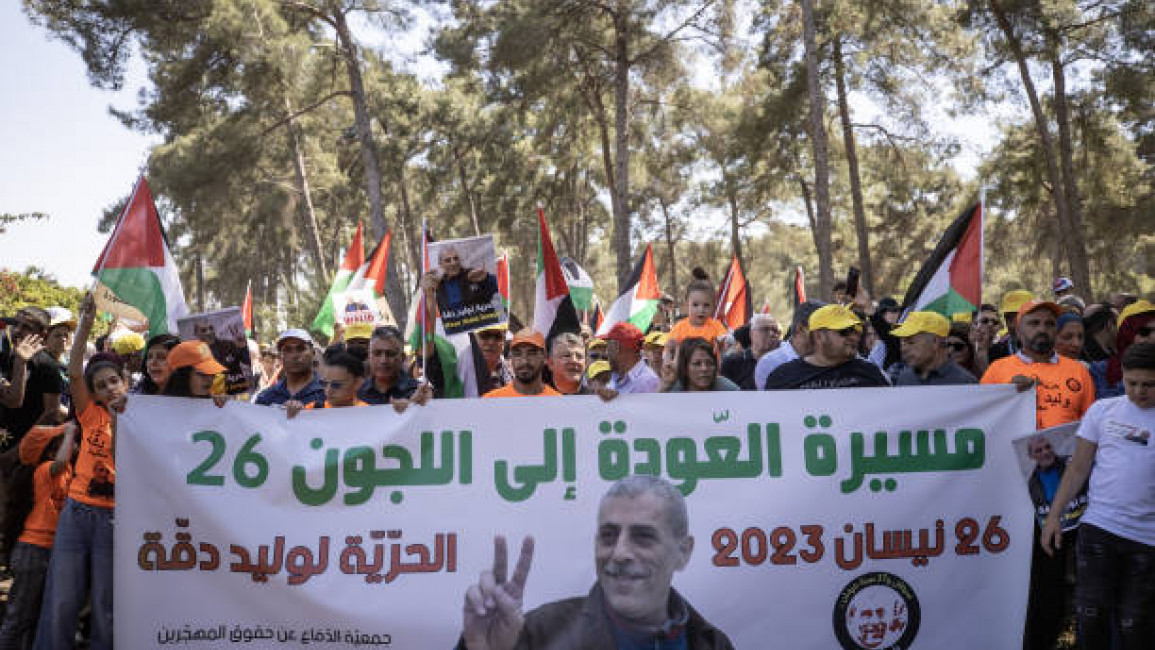Israel transfers Palestinian writer Waleed Daqqa back to prison despite critical health
Israeli authorities transferred cancer-stricken Palestinian prisoner Waleed Daqqa out of intensive care, at the Israeli Asaf Harofeh hospital, and back to the Ramleh prison clinic on Thursday, the Palestinian Prisoners’ Club confirmed.
Daqqa, the 61-year-old prisoner, renowned writer and father of a three-year-old daughter, was diagnosed with bone-marrow cancer last December. He underwent surgery that removed a large part of his right lung before a serious decline in his health condition last March.
Originally from the town of Baqa Gharbiyeh, within Israel’s 1948 boundaries, Daqqa was arrested in 1986. He was convicted for his alleged membership in a Palestinian armed cell that killed an Israeli soldier.
In prison, Daqqa became a renowned writer, mostly known for his play “The parallel time” and novel “The Tale Of The Olive Oil’s Secret”, which Israeli authorities banned from launching at several events.
Cancer patient and Palestinian prisoner Waleed Daqqa faces death in the lsraeli occupation jails after a serious deterioration in his health. pic.twitter.com/szCBUkJNrK
— TIMES OF GAZA (@Timesofgaza) May 24, 2023
In 2018, an Israeli court added two years to Daqqa’s sentence, after accusing him of taking part in the smuggling of cellphones to Palestinian prisoners, prolonging his prison time until 2025.
While in prison, Daqqa married Palestinian activist Sanaa Salameh in 1999. In 2020, Salameh gave birth to their only daughter, Milad, who was conceived through smuggled sperm.
“The news was a total surprise to us, the occupation authorities told us nothing about Waleed’s transfer back to prison”, Salameh told The New Arab.
“The last thing we knew about Waleed is that he was transferred to hospital because his health deteriorated, but later we learned that he had undergone a heart surgery without us, his family knowing, which is a serious legal violation,” she said.
“The last time we visited Waleed was a couple of months ago before he was taken to hospital, and he was already very weak, unable to stand and walk”, pointed out Salameh.
“This was in March, shortly after his health began to decline, and it was about the time he finished his original sentence”, she noted. “Because of the two-year additional sentence of 2018, he was in prison, getting sick without anyone to help him, instead of being at home with us.”
Photo of #Palestinian child Milad Abu Daqqa, daughter of Palestinian prisoner Waleed Abu Daqqa who has been imprisoned in the Israeli occupation jails since 1986. Milad was born of her father's smuggled sperm.#FreeThemAll #FreePalestine pic.twitter.com/6Ozypk370v
— 𝕆 𝕊 𝔸 𝕄 𝔸 | العّود. (@hadoranner22) May 23, 2023
The Palestinian Prisoners’ Affairs Commission said in a statement on Monday that Daqqa was in a critical health condition and that he had lost his speech capacity.
Daqqa’s family and friends, along with Palestinian and solidarity activists launched an international campaign to demand his release.
“Waleed’s lawyer has filed a release petition on humanitarian grounds too, and we all look forward to his coming parole session, next Wednesday”, Ayah Shreiteh, spokesperson for the Palestinian Prisoners’ Club, told TNA.
“Waleed’s condition is so critical that he needs constant medical care, and his transfer back to the Ramleh prison clinic doesn’t help at all,” said Shreitheh.
From his cell room in the “#israeli” prison of 'Ashkelon', the #Palestinian prisoner, Waleed Abu Daqqa, who is sentenced to life and 39 years, sends this touching letter to his two-year-old daughter, Milad, who was born from the smuggled sperm of her father.
— Nawaf Khalifa (@noahfrescott) May 23, 2023
#Free🇵🇸 pic.twitter.com/E3R5Rv9LJf
“The Ramleh clinic lacks basic equipment and personnel and is not fit for a critically ill person like Waleed,” Shreiteh said.
“We hope that the Israeli court will accept his release, especially since he finished his original sentence, but we are also realistic and expect anything from Israeli authorities,” she added.
In early May, Palestinian leader Khader Adnan died in Israeli jail after 86 days of hunger strike, shortly after being transferred out of hospital back to prison cells.
Currently, some 4,900 Palestinians are held in Israeli jails, including more than 1000 detainees without charges, 32 women, and 155 children, according to human rights groups.
Some 700 Palestinian prisoners have health issues, including 24 with different types of cancer.


![President Pezeshkian has denounced Israel's attacks on Lebanon [Getty]](/sites/default/files/styles/image_684x385/public/2173482924.jpeg?h=a5f2f23a&itok=q3evVtko)



 Follow the Middle East's top stories in English at The New Arab on Google News
Follow the Middle East's top stories in English at The New Arab on Google News


